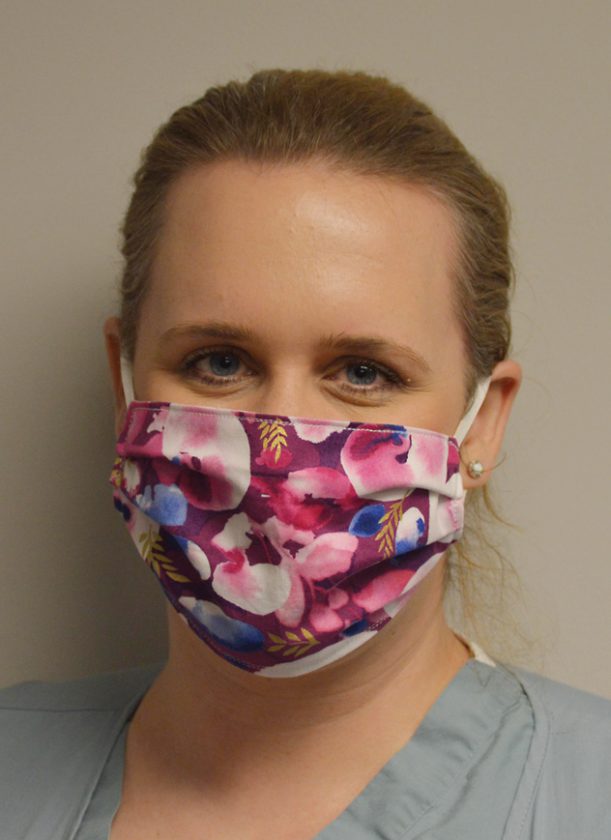Ask the WGH medical team

Dr. Keith Price
The Times Observer asked the Warren General Hospital medical team to help us get information out to our readers through the COVID-19 FAQ-3. Twice a week, or more, we will pose our questions, and your questions, to the experts.
If you would like the Times Observer to submit a question to the WGH medical team, email jsitler@timesobserver.com and we will forward those questions.
Three questions about the coronavirus outbreak
Answers provided by medical team at Warren General Hospital: Joe Akif, Chief Nursing Officer; Michele Welker, RN, Infection Control Nurse; Beth Anderson, RN, Emergency Preparedness Coordinator; Keith Price, MD,Medical Director.
1. How should I clean my cloth facemask?
Your mask should be cleaned after your return home from being in public. Since the coronavirus is very sensitive to soap and water, it can be washed with your regular laundry or put in a small pail of soap and water by itself.
One difficult thing for us all in wearing masks is NOT TOUCHING THE FRONT OF THE MASK. If there were any virus particles on them, you could then transfer them to your hands. Later, touching your mouth, eyes, or nose with your fingers, the virus could gain entry to your body.
When you remove you mask, take it off using the earpieces or ties rather than pulling off from the front. Drop into your soapy container and then WASH YOUR HANDS.
2. I hear there is a new test to see if someone has the coronavirus. Is that available now?
No, that blood test should be available in the next several weeks. HOWEVER, it is a different type of test giving us a different type of information. Currently, there are two ways to test for coronavirus:

Michele Welker
The most familiar test is the SWAB TEST, taken from way back in the nasal cavity. It tests for genetic material (RNA) from the virus, which reproduces in the nasal or oral cavities. It shows if a person is infected with the virus at that point in time. Currently, it takes about two-to-four days to get results from our reference lab.
The other test uses a small BLOOD SAMPLE to look for our immune system’s production of blood proteins (called antibodies) that fight the virus. It can see if this response has been in the recent past (with something called IgM antibodies) or longer ago (IgG antibodies). Most people make the IgM antibody within 14 days of becoming infected.
So how does that blood test help? It DOES NOT help us to know if a person is acutely infected, since a person may be infected and contagious two weeks before this blood test becomes positive. The swab test is the important test for that. It does help in knowing if people did indeed have the infection and now are hopefully immune from getting it again. We can then know more about how far and wide the virus has spread, since one-fourth of people infected have minimal or no symptoms. Plus, the part of blood called plasma from people who have developed those antibodies can be given to some critically ill patients, to help them fight COVID.
3. With only one reported case in Warren County several weeks ago, isn’t having to wear a mask to the grocery store, etc., really overkill?
NO, we don’t believe that it is.

Bethany Anderson
Let’s say you are in the hardware store. Due to so few cases in Warren, no one is wearing a mask, including you. At the checkout, a man you recognize, who always has a “smoker’s cough,” passes close by and has his usual hacking spell. What you don’t know is that he just returned three days ago from visiting his ailing mother in Philadelphia, a state hotspot for COVID. And, he doesn’t know he is infected since he has no fever or increased cough, and unknowingly he passes the virus on to you. Now, several days later, you have a sneezing fit due to “allergies” at your family’s big Sunday dinner.
And, now, woops… five of the 13 people present are infected.
His wearing a mask might have prevented you from getting infected. And, even if he didn’t wear one, your wearing one might have spared you. Likewise, if you had been wearing one at the family gathering, you might not have passed it on. (But, wait a minute! You shouldn’t be having gatherings like that anyhow!)
It only takes one case to spread like wildfire.
PLEASE don’t stop the social distancing and masking when you can’t maintain that six-foot perimeter and frequent hand-washing and surface cleaning! New cases appear to be dropping somewhat nationally. If we stop them now, we will likely see another surge.

Bethany Anderson


